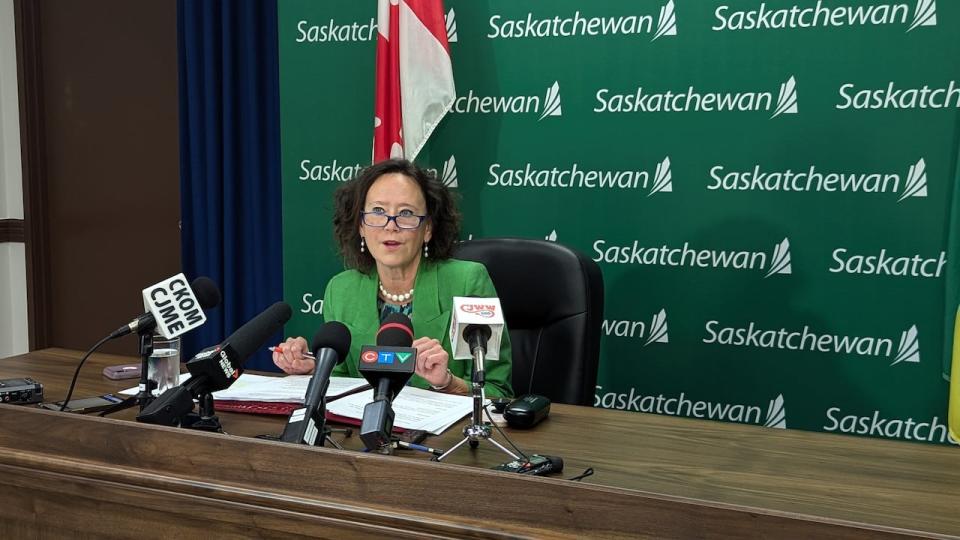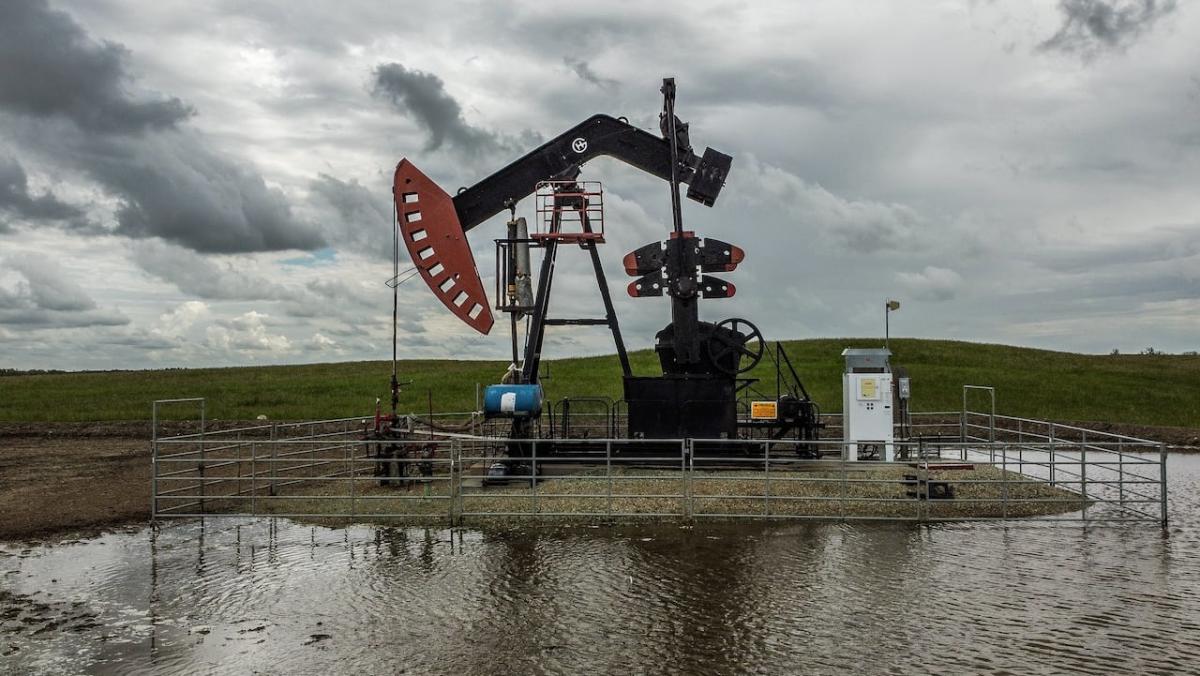The government of Saskatchewan says it rejects federal environmental policy because according to a recent report, it could cost the province tens of billions of dollars in lost revenue.
Speaking at a news conference in Saskatoon on Tuesday about the report from the Economic Impact Assessment Tribunal, provincial Justice Minister Bronwyn Eyre stressed the impact on jobs and the economy in the province.
The report says the province could lose $4.8 billion to $7.1 billion in royalty taxes and another $22.1 billion to $43.3 billion in government revenue by 2050 under the federal policies.
The report also says direct job losses in the oil and gas sector, along with indirect employment impact, “could mean as many as 34,000 fewer jobs economy wide” by 2050.
“If we don’t say it and highlight the problem and highlight the harm, who does?” Eyre said.
She was steadfast that Ottawa deciding how a province uses its resources raises a constitutional issue, but did not go as far to say the province would take Canada to court over the policies — only that Saskatchewan would have evidence, like the new report, if needed.
“If we are to challenge these harmful economic policies, constitutionally or otherwise, we have to have evidence. This arms us with evidence,” Eyre said.

Saskatchewan Minister of Justice Bronwyn Eyre would not state what the province plans to do with the new report, but said it could be used as evidence if it chooses to contest the emissions regulations. (Dayne Patterson/CBC)
The Economic Impact Assessment Tribunal was created under the 2022 Saskatchewan First Act, and is intended to study the economic impacts of federal policies.
Michael Milani, the chair of the five-member tribunal, says it is independent and receives no instruction from the government after its been directed to consider a policy.
It was previously directed to study the federal government’s draft clean electricity regulations.
For its latest report, the tribunal was directed to consider how the Regulatory Framework for an Oil and Gas Sector Greenhouse Gas Emissions Cap and a proposed regulation to reduce upstream oil and gas methane emissions by at least 75 per cent from a baseline emission level in 2012 would affect the Saskatchewan economy.
Both federal documents were published in December 2023. The draft regulations for the emissions cap have not been released. The tribunal’s report was released this month.
For the report, the tribunal requested submissions from industry companies, with more in-depth submissions from Navius, a consultant company; the Conference Board of Canada, a think tank; the provincial Ministry of Energy and Resource; and an expert in natural resource economics and tax policy.
Based on the information it reviewed, the tribunal found that if the federal initiatives are implemented, the province’s “oil and gas production will diminish.”
A Tuesday statement emailed from a spokesperson for the federal minister of environment and climate change said the tribunal was launched with an “underlying ideological agenda” to build a political fight with Ottawa — a claim Eyre said is false.
But the federal spokesperson said “clearly, the release of this report on the eve of a provincial election is an attempt to politicize measures such as the methane regulations, which the Saskatchewan and the federal government have collaborated on.”
The spokesperson said the federal government has “successfully negotiated with Saskatchewan two equivalency agreements on methane pollution, including a draft one earlier this year, which stand-down federal regulations in place of provincial regulations.”
The federal government will continue working “in good faith” with the provincial government “when it comes to the emissions cap for the oil and gas sector, which is focused on reducing oil and gas emissions, not production,” said the spokesperson.
GHG emission results absent in final report
Eyre said Saskatchewan’s emissions have reduced by two-thirds, without federal regulations. That number has been touted in the past for the province’s reduction between 2015 and 2021 and promoted multiple times by Eyre.
However, that reduction amount from the province has been challenged. Oil and gas industries are responsible for reporting their own emissions, making a reduction measurement difficult.
Peter Prebble, a member of the board of directors of the Saskatchewan Environmental Society and a former Saskatchewan NDP member at different points from 1978 to 2007, says despite the provincial government’s claim that its oil and gas methane emissions were reduced to 3.6 million tonnes in 2022, the federal numbers say the emissions totalled 14.3 million tonnes.
While the tribunal was directed to focus on the economic impact of the policies, it said the emissions cap will lead to little, if any, change to global emissions if global demand deviates from the Canada Energy Regulator’s net-zero scenario.
Portions of the consultants’ submissions did refer to reduced greenhouse gas emissions, but they were not outlined significantly in the final report.
“My biggest concern about the tribunal report is that it fails to mention that we’re on the verge of a climate emergency in the world,” Prebble said, noting multiple organizations say greenhouse gas emissions have to be reduced worldwide.
“And there’s no mention of the horrendous economic consequences that will come from facing a worldwide climate emergency.”
He said while there will be economic consequences from pulling back from the oil and gas industry, that’s a necessary part of avoiding a climate emergency.
Although Prebble says the report has significant gaps, he agrees with portions of it, including arguments by some companies in the report who say they need to be given more flexibility on how they meet emission targets, and that a remedy is needed for the disproportionate effect on conventional oil and gas companies, compared with the heavy oil companies.
Multiple consultants in the report disagree with the government’s assertions that there will be no significant impacts on production as a result of the oil and gas methane emission policy.

